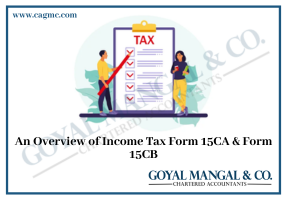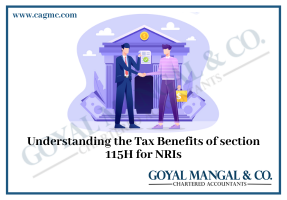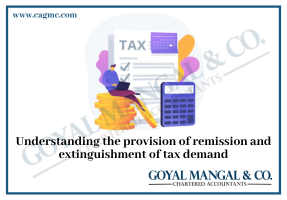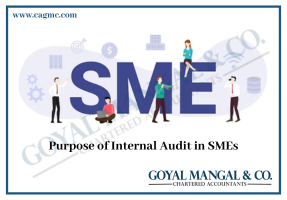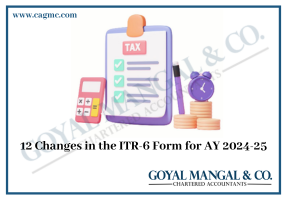
If you’ve ever received that unexpected letter from the tax authorities, you’re not alone. Income tax notices can be intimidating but fear not – we’re here to guide you through the process. From understanding the basics to seeking professional advice, we’ve got you covered. So, let’s tackle those notices with confidence and gain a better understanding of how to handle them like a pro!
Introduction to Income Tax Notices: Understanding the Basics
Income tax notices can be a source of anxiety and confusion for many taxpayers. In simple terms, an income tax notice is a communication from the Income Tax Department to a taxpayer, either seeking information, clarifications, or requesting compliance with tax regulations. These notices can be sent via mail or electronically to the taxpayer’s registered email address on the income tax portal.
The most common types of income tax notices include the notice under Section 143(1) for preliminary assessment, notices for scrutiny assessment, and notices for non-filing of tax returns. It is important to note that receiving an income tax notice does not necessarily mean that there is an issue or that you have done something wrong. Sometimes, these notices are routine procedures initiated by the Income Tax Department to ensure compliance and accuracy in tax filings.
Types of Income Tax Notices: Demystifying the Different Letters
Receiving a notice from the Income Tax Department can be a nerve-wracking experience, but understanding the different types of notices can help ease your concerns. Understanding the different types of notices can empower you to tackle them effectively and ensure compliance with the income tax regulations.
Let’s demystify the various letters that you might encounter and gain insights into what they mean.
- Intimation u/s 143(1): This is a common notice sent after you file your income tax return. It simply informs you about any discrepancies or errors found in your return and the adjustments made by the department.
- Notice u/s 139(9): If you’ve made mistakes in your tax return, this notice gives you an opportunity to rectify them. It usually involves issues like mismatched bank details or incorrect PAN information.
- Notice u/s 142(1): This is a preliminary notice seeking specific information or documents to assess your tax liability properly. It is not something to panic about but requires prompt and accurate responses.
- Notice u/s 148: If the Income Tax Department believes that you have undisclosed income, they may issue this notice to reopen past assessments. This requires a detailed explanation and supporting documents.
- Notice u/s 245: If you have a pending tax demand, this notice will be issued to adjust the outstanding amount against your tax refund.
- Notice u/s 271(1)(b): This notice is sent if the Income Tax Officer believes you have concealed income or furnished inaccurate particulars. Penalties may apply if you are unable to prove otherwise.
- Notice u/s 156: If you have unpaid taxes, this is a demand notice for the outstanding amount. It is essential to address it promptly to avoid further consequences.
Reasons for Receiving Income Tax Notices: What Triggers Them?
Here are some common triggers that could lead to receiving an income tax notice:
- Discrepancies in Income: If there are discrepancies in the income reported in your tax return and the data available with the income tax department, it can lead to a notice. Make sure to report all sources of income accurately and cross-check your figures before filing your return.
- Non-Disclosure of Income: Failure to disclose certain income sources, such as interest earned on savings accounts or fixed deposits, can also prompt a notice. It is essential to declare all your income, regardless of the amount.
- High-Value Transactions: Making significant financial transactions, such as buying or selling property, vehicles, or investments, may attract scrutiny from the tax department. Ensure that you report such transactions and provide the necessary documentation if required.
- Mismatch in TDS Details: Any discrepancies in the tax deducted at source (TDS) details in your return and what is reported by the deductor can lead to an income tax notice. Verify your TDS certificates and rectify any errors before filing your return.
- Large Cash Deposits: Depositing substantial amounts of cash in your bank account without proper explanation can raise red flags with the tax authorities. Keep proper records of the source of funds to avoid any issues.
- High Expenditure: If your expenses seem to be disproportionately higher than your reported income, it may raise suspicions and result in an income tax notice. Ensure that your expenses are legitimate and can be substantiated if required.
- Inconsistencies in GST Returns: For businesses registered under the Goods and Services Tax (GST), discrepancies in GST returns can lead to income tax notices. Ensure that your GST returns match your income tax returns.
- Non-Filing of Returns: Failing to file income tax returns, even if you are not liable to pay tax, can lead to notices and penalties. It is essential to file your returns on time.
Handling Income Tax Notices: Dos and Don’ts
Receiving an income tax notice can be an unsettling experience but fear not – you’re not alone! Many taxpayers have been through this, and with the right approach, you can effectively handle the situation. Here are some dos and don’ts to keep in mind as to how to respond to income tax notice:
Dos:
- Stay Calm: Receiving a notice might be nerve-wracking, but staying calm is crucial. Take a deep breath, read the notice carefully, and understand the details before responding.
- Act Promptly: Time is of the essence when dealing with tax matters. Ensure you respond within the specified timeline mentioned in the notice to avoid further complications.
- Seek Professional Advice: If the notice seems complex or beyond your understanding, consult a tax expert or a chartered accountant. They can guide you through the process and offer valuable insights.
- Keep Documents Handy: Gather all the necessary documents related to the notice, such as income statements, investment proofs, and expense records. Proper documentation will help support your response.
- Address the Issue: Respond to the notice appropriately, addressing the specific points raised. Avoid evasive or incomplete replies, as they might lead to more scrutiny.
Don’ts:
- Ignore the Notice: Ignoring the notice won’t make it go away. It’s essential to address it promptly and take appropriate action.
- Panic or Assume the Worst: Don’t assume the worst-case scenario without understanding the notice’s details. Panic can cloud your judgment and lead to hasty decisions.
- Provide False Information: Honesty is the best policy. Avoid providing false or misleading information in your response, as it can have severe consequences.
- Delay Responding: Timely action is crucial. Delays may result in penalties or additional fines.
- Disregard Future Compliance: After resolving the current notice, don’t forget to be mindful of future tax compliance to prevent further issues.
Remember, an income tax notice is not necessarily an indication of wrongdoing. It could be a routine inquiry or a mismatch in data. By following the dos and don’ts, you can handle income tax notices with confidence and ensure a smoother tax journey. If in doubt, always seek professional advice to navigate the complexities of income tax regulations successfully. Stay proactive, stay informed, and stay compliant!
Responding to Income Tax Notices: Step-by-Step Guide

Here’s a step-by-step guide to help you navigate the process of how to handle Income Tax notices:
- Don’t Panic: The first and most crucial step is to stay calm and not panic. Receiving a notice doesn’t necessarily mean you have done something wrong. It could be a routine inquiry or a minor discrepancy that needs clarification.
- Read the Notice Carefully: Carefully read the entire notice to understand the reason for its issuance. It will specify the section under which the notice has been sent and the required action from your end.
- Gather Documents: Once you understand the reason for the notice, gather all the relevant documents related to the tax year in question. Having organized records will make it easier to respond accurately.
- Seek Professional Advice: If you find the notice confusing or are unsure about how to proceed, consider seeking advice from a tax consultant or a chartered accountant. They can guide you through the process and ensure that your response is appropriate.
- Respond within the Deadline: Most income tax notices come with a specified deadline for response. Ensure you adhere to the timeline and submit your response promptly to avoid any further complications.
- Craft a Clear Response: Prepare a clear and concise response to the notice, addressing each point raised by the tax authorities. Avoid using jargon and provide supporting documents wherever necessary.
- Keep Copies: Make copies of your response and all the documents you submit. It’s always good to have a record of your communication with the tax department.
- Submit through Appropriate Channel: Follow the instructions in the notice regarding the method of submission. Some notices may require a physical response, while others can be submitted online through the income tax portal.
- Track the Status: After submitting your response, keep track of the notice’s status through the income tax portal or by reaching out to the tax department if needed.
- Await Further Communication: Once you have responded to the notice, wait for the tax authorities to review your submission. They may accept your response or seek additional information if required.
Remember to follow this step-by-step guide and respond to an income tax notice promptly and accurately to resolving the matter efficiently.
Seeking Professional Help: When to Consult a Tax Expert
Dealing with income tax notices can be an overwhelming experience, especially if you are unsure about the complex tax laws and regulations. While some notices can be resolved with a simple response, others may require a deeper understanding of tax laws and legal implications. This is where consulting a tax expert can make a world of difference.
If you receive an income tax notice and find yourself perplexed by the jargon and technicalities, it’s a sign that you could benefit from professional help. Tax experts are well-versed in tax laws and can explain the notice’s implications in simple terms, providing clarity and peace of mind. Certain income tax notices may involve intricate tax situations, such as capital gains, foreign income, or multiple sources of income. Also sometimes, income tax notices come with tight deadlines for responses. In such cases, seeking the help of a tax expert can ensure a prompt and well-prepared reply, minimizing the risk of penalties for late submissions.
Certain notices may indicate potential tax liabilities or penalties. A tax expert can conduct a thorough assessment of your financial situation and advise on the best course of action to resolve any outstanding issues. If you receive an audit notice from the tax authorities, it’s crucial to have a tax expert by your side. They can represent you during the audit process, handling all communication with the tax authorities and safeguarding your rights.
In case of disagreements with tax assessments or penalties, a tax expert can guide you through the appeal process, preparing a strong case and representing you before the appellate authorities.
Consulting a tax expert is not limited to handling immediate notices. They can also offer valuable insights and advice for long-term tax planning, helping you optimize your tax liabilities and make informed financial decisions.
In conclusion, income tax notices can be daunting, but seeking the assistance of a tax expert can ease your burden and ensure that you handle them with confidence and accuracy. Whether it’s deciphering complicated tax issues or representing you during audits and appeals, a tax expert can be your trusted ally in navigating the intricate world of income tax and safeguarding your financial interests.
Common Mistakes to Avoid: Preventing Pitfalls in Your Response to Income Tax Notices
Receiving an income tax notice can be nerve-wracking, and responding to it requires attention to detail and precision. It’s essential to avoid common mistakes that could lead to unnecessary complications or further scrutiny. Here are some pitfalls to steer clear of when handling income tax notices:
- Ignoring the Notice: One of the most significant mistakes is ignoring the notice altogether. Responding promptly is crucial, even if you are unsure about the reason for the notice. Ignoring it could result in penalties and legal consequences.
- Providing Incomplete Information: Ensure that your response contains all the necessary details and supporting documents. Incomplete or inaccurate information may lead to misunderstandings and protracted proceedings.
- Missing the Deadline: Missing the deadline for responding to the notice can have serious implications. It’s crucial to note the due date and submit your response within the specified timeframe.
- Responding Emotionally: Receiving an income tax notice can be stressful, but it’s essential to respond calmly and rationally. Emotional responses or confrontational language could hinder a favorable resolution.
- DIY Approach without Understanding: Responding to an income tax notice can be complex, and attempting to do it yourself without understanding the legal jargon or intricacies can lead to errors. Consider seeking professional advice if needed.
- Lack of Documentation: Ensure that you have all the necessary documents and records to support your response. Providing substantial evidence can strengthen your case and expedite the process.
- Misinterpreting the Notice: Take the time to understand the contents of the notice thoroughly. Seek clarification if needed to avoid misunderstandings.
- Making Assumptions: Avoid making assumptions about the reasons for the notice or the intentions of the tax authorities. Stick to the facts and respond based on the information provided in the notice.
- Not Seeking Professional Help: If you find the notice complex or are unsure about the appropriate response, consider consulting a tax expert. They can guide you through the process and ensure a comprehensive and accurate reply.
- Overlooking Appeal Options: If you disagree with the notice’s findings, be aware of your right to appeal. Failing to do so within the stipulated time could limit your options for challenging the notice.
By avoiding these common mistakes, you can navigate the process of responding to income tax notices more effectively. Remember to be proactive, well-prepared, and open to seeking professional assistance when needed. Handling income tax notices with care and attention can lead to a smoother resolution and provide peace of mind during what can be a challenging experience.
The Importance of Proper Documentation: Keeping Your Records Intact
Dealing with income tax notices can be a daunting experience, but one crucial aspect that can make the process smoother and less stressful is having proper documentation. Keeping your records intact is essential when it comes to handling income tax notices effectively.
- Proof of Income: Having clear and organized records of your income sources, such as salary slips, bank statements, and income certificates, will help you respond accurately to any income-related queries from the tax authorities.
- Deduction and Exemption Documents: Properly maintaining receipts and documents for deductions and exemptions claimed is vital. This includes investment proofs like 80C, 80D, and 80G receipts, as well as home loan interest certificates.
- Capital Gains and Investments: For individuals involved in stock trading or having investments in mutual funds or properties, keeping records of purchase and sale transactions is crucial. It helps establish the cost of acquisition and capital gains calculations.
- Bank Transactions: Detailed bank statements and transaction records are essential for cross-referencing with income and expense declarations. It helps ensure that all financial transactions are accounted for correctly.
- Previous Tax Returns: Keeping copies of past tax returns enables you to verify previous filings and provide accurate information in case of any discrepancies.
- Communication with Tax Authorities: Proper documentation of all communications with tax authorities, including responses to previous notices, will help you maintain a clear record of your tax history.
- Business Transactions: If you’re a business owner, maintaining proper records of income, expenses, invoices, and receipts is crucial. It not only helps you respond to tax notices but also aids in the overall financial management of your business.
- Date and Time Stamp: Whenever you receive or send documents related to income tax, ensure to keep a record of the date and time. This timestamp may prove valuable if you need to refer back to specific communications.
- Digital Backup: In addition to physical copies, consider keeping digital backups of all important documents. Cloud storage or external hard drives can be excellent options to safeguard your records from loss or damage.
Remember, proper documentation is not just about how to respond to income tax notice; it also plays a significant role in managing your finances effectively. By staying organized and keeping your records intact, you can navigate income tax processes with confidence and ensure compliance with tax regulations. So, take the time to keep your financial records up to date and create a stress-free tax-filing experience.
The Importance of Proper Documentation: Keeping Your Records Intact
Dealing with income tax notices can be a nerve-wracking experience, but having proper documentation can make all the difference in handling them effectively and with ease. When it comes to income tax matters, keeping your records intact is like having a superpower that can save you from unnecessary stress and hassle.
Stay Organized: Proper documentation means keeping all your financial records well-organized and easily accessible. From income sources to deductions, exemptions, and investments, having everything in order will help you respond to income tax notices promptly.
Peace of Mind: Knowing that you have all the necessary documents and proofs readily available brings a sense of relief. You won’t have to scramble at the last minute to gather evidence or worry about missing important details.
Accuracy in Filing: When your records are in place, you can be confident that you’re filing your tax returns accurately. This reduces the chances of errors and discrepancies, which can lead to unnecessary notices from the tax authorities.
Easy Response to Notices: If you ever receive an income tax notice, having proper documentation simplifies the process of how to respond to income tax notice. You can provide the required information quickly, ensuring a smooth interaction with the tax department.
Record of Past Filings: Keeping copies of previous tax returns gives you a reference point for past filings. It allows you to double-check information and maintain consistency in your tax history.
Supporting Claims: Many tax-saving investments and deductions require supporting documents. By keeping these records intact, you can easily substantiate your claims during tax assessments.
Audit-Ready: In the rare event of an income tax audit, having proper documentation will help you face it confidently. Audits can be less intimidating when you can present well-organized and accurate records.
Avoiding Penalties: Incomplete or inaccurate documentation can lead to penalties and fines. Keeping your records in order reduces the risk of attracting unnecessary penalties from the tax authorities.
Financial Planning: Maintaining proper documentation goes beyond tax-filing. It also aids in financial planning, budgeting, and keeping track of your overall financial health.
Future References: Properly documented tax records can serve as a valuable reference for future financial decisions. They provide insights into your financial journey and can guide you in making informed choices.
In conclusion, proper documentation is a powerful tool that empowers you to handle income tax notices with confidence and ease. It saves you from the anxiety of dealing with tax-related matters and ensures smooth interactions with the tax authorities. So, take the time to organize your financial records and enjoy the peace of mind that comes with being tax-ready. Remember, staying prepared with proper documentation is like having a superpower that lets you tackle income tax notices like a pro!
Staying Compliant: Tips for Avoiding Future Notices
What if there was a way to minimize the chances of receiving income tax notices in the first place? Staying compliant with income tax regulations is key to avoiding future notices and ensuring a smooth tax-filing experience. Here are some valuable tips to help you steer clear of those intimidating envelopes:
Properly maintain all your financial records, including income sources, deductions, and investments. Having organized documentation will make the filing process more straightforward and reduce the likelihood of errors.
Filing your income tax returns before the due date is crucial. Timely filing not only helps you avoid penalties but also showcases your commitment to complying with tax laws.
Ensure that you report all your income sources, including salary, interest, rental income, or any other earnings. Failing to report income can lead to scrutiny from the tax authorities.
While claiming deductions is essential for reducing your tax liability, make sure you are eligible for the deductions you’re claiming. Incorrect claims could attract unwanted attention.
Beware of Cash Transactions: Be cautious about dealing with cash transactions, especially significant ones. Transparency in financial transactions is crucial to maintaining compliance.
Be Mindful of Investment Declarations: If your employer allows for tax-saving investment declarations, make accurate declarations and provide relevant proofs. Misrepresenting investment details may trigger tax notices.
Update Your PAN and Contact Details: Ensure that your Permanent Account Number (PAN) and contact information, such as address, email, and phone number, are up to date with the tax authorities. This ensures smooth communication and receipt of important updates.
If you’re unsure about certain tax provisions or have complex financial situations, consider seeking advice from a tax professional. A tax expert can help you navigate the tax laws and keep you on the right side of compliance.
Stay informed about changes in tax laws and regulations: Regularly review updates from the Income Tax Department to stay aware of any new requirements or revisions.
After filing your tax returns, don’t forget to e-verify them within the specified timeframe. Failing to verify your returns may lead to additional notices or delays in processing.
Remember, staying compliant is not just about avoiding income tax notices; it’s about being responsible citizens and contributing to the nation’s development. By adopting these tips, you can stay on top of your tax responsibilities and enjoy a hassle-free tax-filing journey. So, let’s commit to staying compliant and ensure a brighter financial future!
Conclusion
In conclusion, dealing with income tax notices may seem overwhelming, but it’s essential to approach them with a calm and organized mindset. Understanding the types of notices, knowing how to respond, and keeping proper documentation are key to handling them effectively. Remember to seek professional help when needed and avoid common mistakes that could complicate matters further. Being proactive in maintaining accurate records and staying compliant with tax regulations can save you time, stress, and potential penalties. With the right approach and a bit of preparation, you can navigate income tax notices confidently and ensure a smooth tax-filing experience. So, stay informed, keep your records intact, and tackle income tax notices like a pro!


